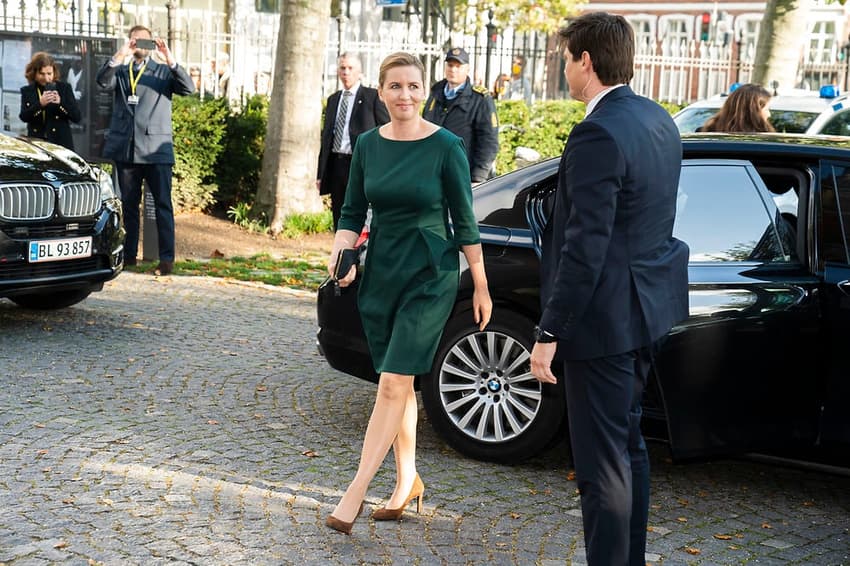What did Danish PM Frederiksen say at opening of parliament?

Denmark’s traditional opening of parliament took place on Tuesday. Here are the main points from Prime Minister Mette Frederiksen’s speech.
Most of the regular traditions of the annual opening of parliament were observed, despite the ongoing situation with the coronavirus, although a church service attended by most members of parliament was moved from its normal location at Christiansborgs Slotskirke to the larger Holmens Kirke nearby, to allow social distancing.
The opening of parliament is traditionally attended by all lawmakers as well as representatives from the royal family. This year was much the same, with Queen Margrethe, Crown Prince Frederik and Crown Princess Mary each in attendance, albeit with a less-than-capacity parliamentary chamber.
Outside the Christiansborg parliament, a number of different groups demonstrated. The largest of these was arguably protestors unhappy with Denmark’s progress on its climate ambitions.
I mine 15 år på Tinge, har jeg aldrig oplevet så massiv en modtagelse som klimabevægelserne gav os idag. Vi fik et grønt mandat ved valget. Det kan ikke skubbes foran eller udskydes. Det er nu. #dkgreen pic.twitter.com/IpbiZW7TZ8
— Morten Østergaard (@oestergaard) October 6, 2020
Parents' group ‘Hvor er der en voksen?' (‘Where is an adult?') continued their ongoing campaign for guaranteed ratios of staff-to-children in the country's day care institutions.

Photo: Emil Helms/Ritzau Scanpix
A small group of people also gathered to demonstrate against the country's coronavirus measures.
Once the church service concluded, the Prime Minister traditionally gives a speech at which she outlines the government’s strategies and key issues for the incoming parliamentary session, and sums up the previous year. No debate is held on the ceremonial opening day.
READ ALSO: Trust is key word for PM at 2019 opening of Denmark's parliament
Here are the main points of Frederiksen’s speech:
The government is to propose setting aside two billion kroner annually until 2025 for a so-called ‘green disposable amount’ (grønt råderum). The money will come from EU funding and the budget.
The government is to propose a law enabling asylum seekers to be transferred to countries outside of Europe
Frederiksen also said she wants to give police extra powers to enforce assembly bans on groups in specified areas for limited periods. This is a measure against antisocial behaviour by youths at places such as train stations on metropolitan trains, an issue Frederiksen has previously cited as a social problem.
A ‘coronavirus warning system’ for response to increasing infections is to be set out. The purpose of this is to enable more predictable response to outbreaks, Frederiksen said.
The government is to give seven municipalities across the country -- Helsingør, Rebild, Viborg, Middelfart, Holbæk, Langeland and Esbjerg – “complete freedom” over their municipal welfare budgets, meaning they will be exempt from as much state regulation as possible in areas including elementary schools, daycare and senior care.
Comments
See Also
Most of the regular traditions of the annual opening of parliament were observed, despite the ongoing situation with the coronavirus, although a church service attended by most members of parliament was moved from its normal location at Christiansborgs Slotskirke to the larger Holmens Kirke nearby, to allow social distancing.
The opening of parliament is traditionally attended by all lawmakers as well as representatives from the royal family. This year was much the same, with Queen Margrethe, Crown Prince Frederik and Crown Princess Mary each in attendance, albeit with a less-than-capacity parliamentary chamber.
Outside the Christiansborg parliament, a number of different groups demonstrated. The largest of these was arguably protestors unhappy with Denmark’s progress on its climate ambitions.
I mine 15 år på Tinge, har jeg aldrig oplevet så massiv en modtagelse som klimabevægelserne gav os idag. Vi fik et grønt mandat ved valget. Det kan ikke skubbes foran eller udskydes. Det er nu. #dkgreen pic.twitter.com/IpbiZW7TZ8
— Morten Østergaard (@oestergaard) October 6, 2020
Parents' group ‘Hvor er der en voksen?' (‘Where is an adult?') continued their ongoing campaign for guaranteed ratios of staff-to-children in the country's day care institutions.

Photo: Emil Helms/Ritzau Scanpix
A small group of people also gathered to demonstrate against the country's coronavirus measures.
Once the church service concluded, the Prime Minister traditionally gives a speech at which she outlines the government’s strategies and key issues for the incoming parliamentary session, and sums up the previous year. No debate is held on the ceremonial opening day.
READ ALSO: Trust is key word for PM at 2019 opening of Denmark's parliament
Here are the main points of Frederiksen’s speech:
The government is to propose setting aside two billion kroner annually until 2025 for a so-called ‘green disposable amount’ (grønt råderum). The money will come from EU funding and the budget.
The government is to propose a law enabling asylum seekers to be transferred to countries outside of Europe
Frederiksen also said she wants to give police extra powers to enforce assembly bans on groups in specified areas for limited periods. This is a measure against antisocial behaviour by youths at places such as train stations on metropolitan trains, an issue Frederiksen has previously cited as a social problem.
A ‘coronavirus warning system’ for response to increasing infections is to be set out. The purpose of this is to enable more predictable response to outbreaks, Frederiksen said.
The government is to give seven municipalities across the country -- Helsingør, Rebild, Viborg, Middelfart, Holbæk, Langeland and Esbjerg – “complete freedom” over their municipal welfare budgets, meaning they will be exempt from as much state regulation as possible in areas including elementary schools, daycare and senior care.
Join the conversation in our comments section below. Share your own views and experience and if you have a question or suggestion for our journalists then email us at [email protected].
Please keep comments civil, constructive and on topic – and make sure to read our terms of use before getting involved.
Please log in here to leave a comment.